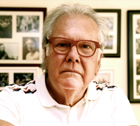Would someone please alert the search and rescue squad: the NSW Liberal Party is missing in action and no one knows where it is.
While Liberal Leader Barry O’Farrell is reportedly wandering the Kokoda Track, other senior figures are resting in deck chairs at secret holiday resorts.
With State Parliament to resume in a week’s time, there is a keen interest in whether the Liberals will support the Iemma Government’s legislation to privatise the State’s power industry or not.
Certainly Premier Morris Iemma and Treasurer Michael Costa are hoping that the Liberals will save their bacon by voting to back the sell-off. Liberal votes have become even more critical following the weekend decision by Andrew Stoner’s Nationals to oppose privatisation.
O’Farrell hasn’t declared his party’s position because he is enjoying the internecine warfare within the ALP too much and he hasn’t seen the government’s proposed legislation.
But there must come a time when he will have to show leadership — something he has effortlessly avoided when faced with dealing with the mad religious right in his own ranks.
The Business Alliance, comprising Patricia’s Forsyth’s Sydney Chamber of Commerce, Christopher Brown’s Tourism and Transport Forum, David Elliott’s Civil Contractors’ Federation, Paul Ritchie’s Australian Business Ltd and Ken Morrison’s Property Council of Australia, are pushing “Fatty O’Barrell” to do the true blue thing and back privatisation.
However, “The Barrell” has an escape clause (he always does!) and it is this: he can withhold Liberal support on the grounds that the Iemma-Costa model is nothing more than a firesale and that the market conditions are fraught with danger.
This path will do incalculable harm to his standing in the business community who like their Liberal politicians to be greed-driven free marketeers. On the other hand, he could lead his troops into the “No” lobbies and inflict a devastating — if not terminal — defeat upon Iemma and Costa.
How O’Farrell deals with Labor’s selloff plan is his first major leadership test since he succeeded Peter Debnam one year ago. He will emerge as a future premier or yet another Opposition dud.
Meanwhile, the NSW ALP conference has been held at Sydney Town Hall for more than a century and the cavernous hall has echoed to the orations of William Holman, Jack Lang, Bill McKell, Neville Wran and Bob Carr. But not for this weekend’s historic conference to decide on the privatisation of the state’s electricity industry and the first NSW conference speech by Prime Minister Kevin Rudd.
The Town Hall is undergoing extensive renovations and therefore unavailable. So the party’s Sussex Street machine decided to move it to the Sydney Convention Centre at nearby Darling Harbour. But when the conference was brought forward from the usual long weekend in June to May, the substitute venue was no longer available. Instead of looking for an alternative location large enough to hold the 700 delegates plus observers, the machine booked a smaller room capable of seating delegates only.
This means that observers will now be locked out of the conference and forced to watch proceedings on a live feed relayed to TV screens.
Party cynics believe that the organisation exploited the venue difficulties to opt for a smaller venue and exclude the anti-privatisation rank and file from the debate.
But an email obtained by Crikey carried this rallying cry to the troops: “However, all they’ve done is create two protest groups — one inside the conference and one outside. So I hope you still come along to the conference to swell our numbers.”








There are some other profound reasons not to support the sell off from the Liberal Party framework – as you say poor market conditions. Also straight out decency – oppositions are supposed to keep govt to their policy platform which demonstrably excluded the selloff. The people just didn’t vote for it. Thirdly, in the age of dangerous climate change as I keep on saying we as a society actually need the expertise and social capital/goodwill of the union movement to roll out massive energy restructuring (not least to demonstrate to developing countries it can be done). It might annoy but unions while proportionately smaller in membership still have very great coverage and that free riding non members can always switch to higher unionism again depending on IR conflict. Lastly even former AG NSW John Dowd (Liberal) was on radio 702 last Monday eloquently stating he was for public ownership of this essential service. It’s all about balance of govt responsibility and market forces.